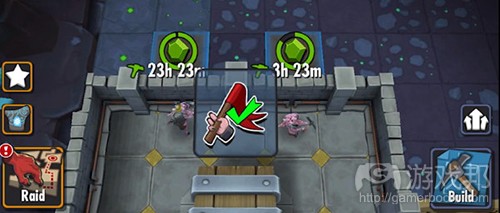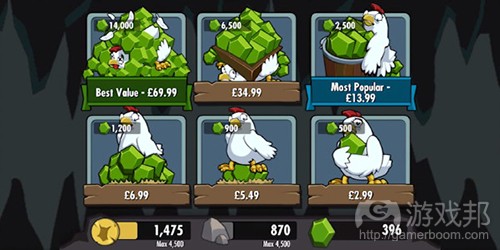从《地下城守护者》看F2P游戏的原罪论
作者:Oscar Clark
EA发布了重制版本的Bullfrog经典游戏《Dungeon Keeper》招致众怒,有不少行业博客和评论甚至以“IAP如何摧毁了游戏行业?”以及“压榨金钱”等言论作为文章标题。但我想知道这对行业发展状况究竟意味着什么,以及我们该如何在处理这一商业模式的同时保护好我们最珍视的品牌。
我试图忽略其中最为竭斯底里的空洞回应,但我无法忽略这些文章在主流行业网站所得到回应的广泛性。所以我认为是时候深入思考大家的说法,以及我们可以从中汲取的教训。在此请原谅我没有对特定的文章指名道称,因为我认为这根本无济于事。还是让我们看看其中一些论断,并想想我们能否从中获得富有建设性的意见吧。
免费模式手机游戏并不是非常好
显然,这是一个稻草人争论,即使是费模式游戏并不是你的那杯茶,也不意味着这种经济模式本身就具有内在的恶劣或不可回避的瑕疵。如果这就是我们对竞争对手游戏的看法,那不也是我们的一次改进机会吗?对我来说,“免费”的要点在于降低准入门槛,令玩家更易于绕过应用商店进入游戏。只有这样我们才能真正向他们展示游戏有多棒,以及为何我们的游戏值得一试。
这个模式还实现了免费玩家对游戏的价值,即创造庞大的社区和病毒传播性。当然,移除付费墙也会产生我们因没有提前付费而不会全身心投入的问题。免费模式游戏必须加倍努力才能保持玩家继续游戏。这意味着我们必须让游戏易于上手和体验,也就是要制作更好的游戏,因为这一点甚为关键。
微交易会损害玩法
这是关于IAP的另一个空洞结论。这里存在一个真钱交易将玩家带离严重偏离终止怀疑的境地这种问题。作为设计师我们必须对此保持敏感态度,并围绕这一限制条件设计游戏。有个应对这一问题的方法就是保持对游戏空间和流程的敏感性,以便确定适用于游戏的盈利方法。
讽刺的是,游戏所使用的宝石就是一个意在将真钱交易与游戏体验相隔离的举措。但是,我认为以《地下城守护者》及许多相似的游戏为例,这种差异化已经丧失其神秘感,开发者不妨更慷慨一点。另一个方法就是用钱作为一种设计工具,将现实世界的结果引进游戏体验。但是,我们要慎用这种模式。我们也许可以考虑一下如何用钱来引进新的玩法战略,而不仅仅局限于揪住免费玩家究竟有什么用处这个问题。
游戏只知索取却从不给予
这个论断极为有害,它甚至比F2O游戏过度依赖易消耗商品这种结论更糟糕,那些一次性道具在消失之前可以给予玩家短暂的加速或能力提升。这可能让玩家真正感到不悦,因为到头来它们究竟为玩家留下了什么消费价值?如果我花了70英磅,可是你所能展示的不过是一个被清空的地下城,这算是一种回报吗?
不要误解我的意思,易消耗品与包括永久性道具和持久性道具等其他IAP商品一样在游戏中占有一席之地。在此我并不打算探讨它们之间的区别,只想说我们应该创造为玩家创造预期和持续价值,这样才能取悦玩家。如果游戏与总向人伸手要钱的乞丐一样,开发者最终会失去玩家信任和终身价值。
这种游戏真是令人不屑的垃圾
我每次听到这句话都会很不安。你不能仅因为自己是富有经验的游戏开发者/玩家,就认为自己所喜欢的东西才能够定义为具有娱乐性的游戏。我们首次面临这样一个并不自称为游戏玩家的庞大用户市场。这并不是令游戏降格的理由,但我担心的是太多游戏将玩家视为孩童,尤其是在教程阶段,EA游戏《地下城守护者》在这方面表现极为明显,呈现了过度的手把手式的引导教程。
但是,我并不认为这是该游戏的真正问题所在。玩家在接触它之前就已经有了准确的心理预期,它也并非重现原版游戏设计,它甚至不是一款RTS游戏。我突然喜欢上了这款游戏,但我担心重制意味着它已经给《地下城守护者》品牌造成了一些伤害,因为它并未完整传递其游戏理念。但这一点能否复原仍然有待观望。
时间延迟机制阻碍了游戏玩法
这是我大部分同意的一个观点。F2P游戏中具有“冷却时间”或收获机制。但是,这里也会出现时间延迟让玩家无比痛苦,甚至让非付费玩家退出游戏的情况。《地下城守护者》有不同的障碍,其中一些甚至需要高达24小时的清除时间,因为你的Imps数量有限,这意味着你无法做其他任何事情。虽然这种机制具有让你返回游戏的价值,但却不是一个聪明的做法。
另一个不同的例子是《实况赛车3》中的维修机制,它却让游戏更具吸引力,并鼓励玩家去使用其他汽车,为游戏体验创造了一种自然的间歇期以及重返游戏的重要理由。从这一过程中赚钱是另一回事,并且你很难在不惹恼玩家的情况下实现这一点。
购买14000颗宝石要花69英磅!
有位《地下城守护者》玩家曾抱怨自己要花24小时或者243颗宝石才能解琐一个地面障碍,其中花费约1.2英磅。这一争论本身就有问题,因为它没有考虑到你在游戏过程中可赚到的免费宝石数量。
但是,我对此的问题则是设计师并没有考虑到玩家为何花钱购物。我们并不是因为喜欢游戏,或者是想克服挫折而花钱。如果只是因为受挫,我们就会离开游戏。玩家在游戏中花钱是因为他们希望实现未来价值。
果真如此,我们就必须理解玩家每次消费的心理预期。如果我想清除上一个障碍以便进入一个新的金矿,我就必须打败一个敌人,那么也许我会愿意为此花点钱。但是,每次消费都有相应结果,并且花1.2英磅清除这个障碍后,我就会质疑自己究竟获得了什么价值,如果我觉得自己受骗了(虽然我实际上并没有),我就会离开并且告诉其他人这种体验有多糟糕。我们必须格外注意自己的收费项目及其对游戏流程的影响。
免费模式正日益趋于毒害性,但这并不是因为它本身就是个错误,或者具有原罪或剥削性。它之所以成为问题是因为过于强调金钱而非玩家体验。这正是我在游戏过程中所反对的东西,但我并不谴责这种模式,我只批评游戏。虽然我认为《地下城守护者》虽然有不少改进空间,但这也并非它的核心问题。
我们是时候停止争论免费模式了,它只是一种商业模式而已。
我们应该把目光转向玩家。如果我们想制作更好的游戏,就必须清楚其关键在于与玩家进行长期的交互。我们并不希望游戏只是昙花一现,我们想要一种给玩家带来信任、欢乐和开心的关系。我们应该与同样关心我们游戏的人一起分享自己的爱,对我来说这意味着我们必须将游戏打造成一种服务。(本文为游戏邦/gamerboom.com编译,拒绝任何不保留版权的转载,如需转载请联系:游戏邦)
The problems with Dungeon Keeper and why in-app purchases aren’t inherently evil
By Oscar Clark
Oscar Clark offers the case for the defence for IAPs and why the issues lie with game design decisions, not the business model itself
[Oscar Clark is Evangelist for Everyplay. To find out more about what Oscar is evangelising about visit the Everyplay blog.]
EA’s release of their reworking of the Bullfrog classic Dungeon Keeper has raised a lot of righteous anger from several industry-types with blog posts and reviews with such headlines as “How IAP is destroying the industry” to “Wallet reaping”. But I wonder what this says about the state of play of our industry and also what it says about how we handle not only the business model but also our most treasured brands.
I’m trying to ignore the most hysterical frothing responses but I can’t ignore how far and wide the response to these articles has seems been trending across industry sites. So I thought it was time to take a more thoughtful look at what’s being said and what lessons we can learn. Forgive me for not wanting to draw out specific articles as I suspect that’s not particularly helpful. Instead let’s look at some of the arguments and see if we can take a constructive view of them.
Free-to-play mobile games aren’t very good
Obviously, this is a straw-man argument and even if free-to-play games aren’t your cup of tea that doesn’t mean the business model itself is inherently bad or irrevocably flawed. If that’s what we think of the competitions’ games, then isn’t that an opportunity for us to do better? For me the point of ‘Free’ is to reduce the barriers to entry; to make it easier to get players past the app store and into our game. Only then can we really show them how good it is and why playing (and paying) would be worthwhile.
The model also recognises the values that free players contribute in terms of creating critical mass of community and virality. Of course, removing the paywall has consequences as when we don’t pay upfront we have no invested utility. Free-to-play games have to work a lot harder to keep you playing. That means we have to make the game easy to pick-up and play; in the end we have to make a better game because it matters more.
Micro-transactions are detrimental to gameplay
Another blanket statement made about in-app-purchase, but this time there is something to it. There is a real problem when real-money transactions take the player too far out of their suspension of disbelief. As designers we have to be sensitive to this and design around this restriction accordingly. One way to deal with this to be sensitive to the pace and flow of a game and to identify moments which work with the game to monetise.
Ironically the use of gems is an attempt to separate the real-money transaction from in-game experience. However, I think in the case of Dungeon Keeper, and many similar games, this distinction has lost its mystery and maybe a little more ongoing generosity would help. Another way to look at this is to use money as a design tool in itself; a way to introduce real-world consequences into the playing experience. However, we should be careful about over-using that model. Perhaps instead we can look at how we can use money to introduce new strategies of play; rather than only ever pimping out what a free player can do.
They just want your money and give you nothing
This sentiment is really quite damaging and it’s worse than where F2P games overly rely on consumable goods; those one-shot items which give short term boosts/speedups before disappearing. These can leave players feeling genuinely unhappy, as at the end of the day, what are they left with to show for their investment? If you spend £70 and all you can show for it is a cleared space in your dungeon, is that rewarding?
Don’t get me wrong consumables have a role to play alongside other in-app purchases including permanents and durables. I won’t go into the differences here and will just say we need to create anticipation and ongoing value to have happy players. If the game is little more than an exponential begging bowl you will lose trust and life-time value.
Every single person who gave this 5*s are [Expletives]!
Ooh! This one upsets me every time I hear it. Just because you are an experienced game developer/player doesn’t mean that what you like is the only definition of what is entertaining ,or indeed what is a game. We are for the first time looking at a truly mass-market audience who don’t have the same language of play that we do. That isn’t an excuse to reduce games to the lowest common denominator however and I fear that too many games treat players like children; especially in tutorials, and I would argue that the one in EA’s Dungeon Keeper was overly heavy handed.
However, I don’t think that is the real issue for the game. Players are coming to it with a precise expectation and this is not intended as a recreation of the original; it’s not even an RTS. I happen to quite like it but I fear that the reaction means that it has already caused some damage to the Dungeon Keeper brand because its take on the game was not fully communicated. Whether that can be recovered is yet to be seen.
Time delay mechanics stop my gameplay
Actually here is one I largely agree with. There is a place for ‘cool-down’ or harvesting. However, there comes a point where the time delays involved are just so painful that non-payers would just churn. Dungeon Keeper has different blocks, some of which take up to 24 hours to clear, and because you have a limited number of Imps it means you can’t do anything else. There is a value in having mechanisms which give you a reason to return, but this feels clumsy.
A different example, such as damage repairs in Real Racing 3, actually makes the game more compelling and encourages the use of other vehicles as well as creating a natural break from the experience combined with that all important reason to return. Making money out of that process is a different thing and really tricky to do without annoying players.
It costs £69 for 14000 gems!!
In one example of Dungeon Keeper the presenter complains that it takes 24 hours or costs 243 Gems to unlock a single solid block of ground which, even if we were generous and assume the “Best Value” price, costs around £1.20. The argument is flawed as it doesn’t take into account the free gems you can earn during play; but they still have a point.
However, my problem with this is that the designers haven’t taken into account the reasons why people buy. We don’t buy because we are enjoying a game, or even to overcome frustration. If it was just frustration we would churn. Players spend money in a game because they anticipate future value. For once I’m not just making that up; check this paper to see that it has been properly studied: Bong-Won Park, Kun Chang Lee: Exploring the value of purchasing online game items. Computers in Human Behavior 27(6): 2178-2185 (2011).
If this is true we have to understand what anticipation is offered for every purchase. If I want to clear the last block to now in order to get to a new gold mine I desperately need to fight off an enemy, and then perhaps I might be willing to spend some money. However, every spend has consequences and after spending £1.20 to clear that block I will question the value I have actually obtained and if I feel cheated (even if I am actually not) I will churn and we will tell other people how terrible the experience was. We need to be more careful about what we charge for and what it says about the flow of the game.
I could continue for many pages on this topic; but I suspect I would rapidly start to repeat myself. The free-to-play model is becoming toxic, but not because it’s actually inherently wrong or evil or manipulative. It’s becoming a problem because it places the emphasis on the money and not the player experience. That’s what I object to when I see a poorly implemented playing experience; but I don’t blame the model, I blame the game. And for the record I don’t feel that way with Dungeon Keeper; although I think there is plenty of room for improvement.
It’s time we stopped talking about free-to-play. That’s just one model.
Instead it’s time we focused on the player. If we want to make better games we need to understand that it’s about engaging with our audience for the long-term. We don’t want a one-night-stand, we want a relationship that brings trust, delight and joy for our players. We should be sharing our love for our amazing games with people who also care about them, and that for me means building games as a service.(source:develop-online)
上一篇:分析任天堂当前所面临的艰难处境
下一篇:创造潜行游戏时需要避免的一些问题










































